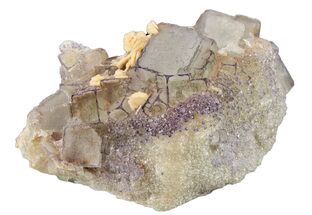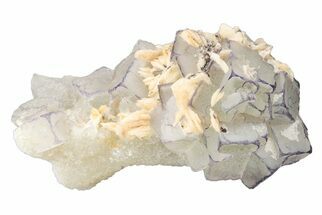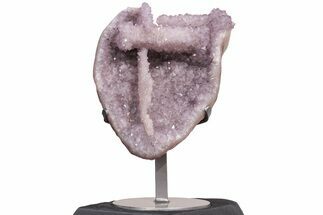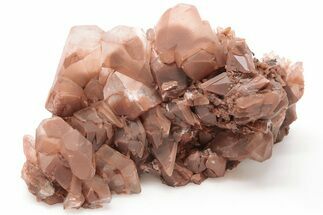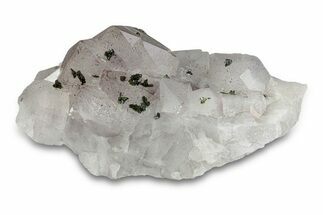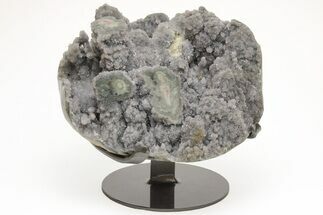This Specimen has been sold.
4.7" Red Cap Amethyst Crystals - Thunder Bay, Ontario
This is an amethyst formation with multiple layers containing hematite inclusions, collected from the Purple Mountain Mine near Thunder Bay, Ontario.
In the 1950s, amethyst deposits were discovered about 30 miles northeast of Thunder Bay, Ontario while building a road. It has been mined in the area since the 1960s. This material can range from light, delicate purple to almost black in color. One very distinctive characteristic of many Thunder Bay amethyst crystals is the inclusion of red hematite as microscopic disks or spherules within the crystals. These inclusions can cause crystals to have red highlights, zones, or even appear completely red in color.
Amethyst is a purple variety of quartz (SiO2) that owes its violet color to natural irradiation, iron impurities, and the presence of trace elements, resulting in complex crystal lattice substitutions. It is considered a semi-precious gemstone, and just two centuries ago was considered to have a value on par with diamonds, sapphires, and rubies. The largest and best known amethyst deposits occur in volcanic formations in southern Brazil and Uruguay, but many localities around the world produce an amazing variety of amethyst crystals and formations.
Amethyst is a purple variety of quartz (SiO2) that owes its violet color to natural irradiation, iron impurities, and the presence of trace elements, resulting in complex crystal lattice substitutions. It is considered a semi-precious gemstone, and just two centuries ago was considered to have a value on par with diamonds, sapphires, and rubies. The largest and best known amethyst deposits occur in volcanic formations in southern Brazil and Uruguay, but many localities around the world produce an amazing variety of amethyst crystals and formations.
About Quartz
Quartz is the name given to silicon dioxide (SiO2) and is the second most abundant mineral in the Earth's crust. Quartz crystals generally grow in silica-rich environments--usually igneous rocks or hydrothermal environments like geothermal waters--at temperatures between 100°C and 450°C, and usually under very high pressure. In either case, crystals will precipitate as temperatures cool, just as ice gradually forms when water freezes. Quartz veins are formed when open fissures are filled with hot water during the closing stages of mountain formation: these veins can be hundreds of millions of years old.
Quartz is the name given to silicon dioxide (SiO2) and is the second most abundant mineral in the Earth's crust. Quartz crystals generally grow in silica-rich environments--usually igneous rocks or hydrothermal environments like geothermal waters--at temperatures between 100°C and 450°C, and usually under very high pressure. In either case, crystals will precipitate as temperatures cool, just as ice gradually forms when water freezes. Quartz veins are formed when open fissures are filled with hot water during the closing stages of mountain formation: these veins can be hundreds of millions of years old.
SPECIES
Quartz var. Amethyst & Hematite
LOCATION
Purple Mountain Mine, Thunder Bay, Ontario, Canada
SIZE
4.7" long
CATEGORY
SUB CATEGORY
ITEM
#164411
 Reviews
Reviews

